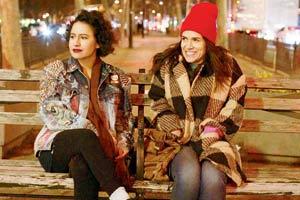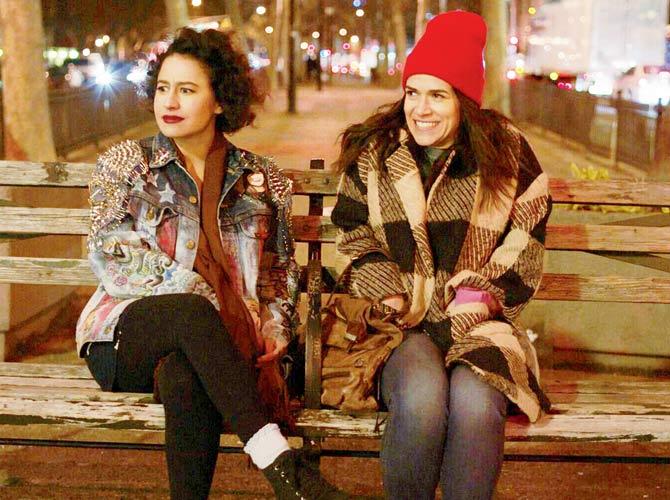Rome and Venice are reserved in our imagination for honeymooning, but travelling with a female friend to such venues is a different ballgame


Illana Glazer (left) and Abbi Jacobson play best friends who revel in their friendship in the Broad City comedy series
ADVERTISEMENT
 About half an hour after my Turkish delight, Asli, casually suggested I spend April 18 with her in Venice, Mona texted to say she could meet me in Rome on the 28th. I was beside myself with joy. The thought of being with each of these women in two glorious, historic cities made me beam. "It sounds so romantic," I think I may have said to both Asli and Mona, and I meant it. Both women are incredibly resourceful, intelligent, witty, and have such unique perspectives that being able to see a new city with them first-hand implies having an elevated experience of the entire affair, where instead of it being touristic, clichéd and mundane, it almost always becomes something artistic, mystical, irreverent and entertaining, all at the same time.
About half an hour after my Turkish delight, Asli, casually suggested I spend April 18 with her in Venice, Mona texted to say she could meet me in Rome on the 28th. I was beside myself with joy. The thought of being with each of these women in two glorious, historic cities made me beam. "It sounds so romantic," I think I may have said to both Asli and Mona, and I meant it. Both women are incredibly resourceful, intelligent, witty, and have such unique perspectives that being able to see a new city with them first-hand implies having an elevated experience of the entire affair, where instead of it being touristic, clichéd and mundane, it almost always becomes something artistic, mystical, irreverent and entertaining, all at the same time.
It dawned me later how unconventional my life is, in that most women imagine being in cities such as the ones I will be visiting with their lovers or their boyfriends or their husbands or their fiancés. These venues are reserved in our imagination for honeymooning. Or, if single, women keep themselves open to meeting other single men while they're there (I'm thinking of the film Before Sunrise). I've had my fair share of travel with a beloved, some of which I've detailed in my book, but travelling with a female friend is a totally different ballgame. The thrill is unique; possibly because you feel like you can be your most un-self-conscious self. Often, when I'm hanging out with Mona, whether in a supermarket or a mall or an art gallery or a restaurant or a park, pretty much anywhere, I feel as though we're protagonists in a film. We're so into each other, so immersed in the other's stories, so obsessed with listening, sharing, being funny, spontaneous that we seem eclectic, like we're lost in our private world of exchange. Sometimes it feels like when we're together, we're in this bubble that contains just the two of us, blocking out everything else that is external. We filter the world through this translucent shield. We shamelessly walk hand in hand. Mona even gets maternal with me, cautioning me at traffic intersections, holding my hand when we're crossing the street. We're both present and not at the same time. We exist in that space we're inhabiting, but we're also on another plane, one in which we are both enacting the lead roles in the stories of our lives. We are each other's plus ones.
As we grow into and out of adolescence, we are conditioned to think of chemistry in a sexual way. We are led to think of 'the one' as that person, usually heterosexual, who will complete us, who will allow us the space to be our truest selves. We think of our female friends as the ones with whom we narrate those incidents to. Which is perhaps why most films and television, especially those written by men, when they focus on female relationships, premise them on the subject of men. Their conversations are about recounting to each other the excitement of meeting men or the conflicts each character faces with a love interest. When I re-watched Ally McBeal a few months ago, I realised that I had misunderstood the synopsis of that dramedy as being about a professional woman's search for Mr Right. Instead, I found, upon revisiting it, that the best moments, the most precious screen time was between Ally and her roommate and best friend Renee. I began to view certain shows from the prism of female friendship and found great joy in those that celebrated the chemistry between two women in all its non-sexual glory. When I watched the first episode of the latest season of Broad City, I was almost in tears because the shows creators, Illana Glazer and Abbi Jacobson, decided to zoom in on how the two of them, who play best friends to each other, met in New York City all those years ago, revealing two parallel scenarios, both of which end in their eventual chance encounter, like they were destined to meet. I texted Mona and told her she had to watch it, and then we viewed the last episode of that season together, the one in which the two of them celebrate the anniversary of their friendship.
The moral of the story of my re-immersion into these new instances of popular culture written out by women was that the plot is beginning to gradually evolve. It feels like we might finally be moving towards an era in which we, as women, realise that our female friends could be enough. That they don't have to be side stories to the main events of our lives, but can in fact constitute the whole delicious narrative.
Deliberating on the life and times of Everywoman, Rosalyn D'Mello is a reputable art critic and the author of A Handbook For My Lover. She tweets @RosaParx. Send your feedback to mailbag@mid-day.com
Catch up on all the latest Mumbai news, crime news, current affairs, and also a complete guide on Mumbai from food to things to do and events across the city here. Also download the new mid-day Android and iOS apps to get latest updates
 Subscribe today by clicking the link and stay updated with the latest news!" Click here!
Subscribe today by clicking the link and stay updated with the latest news!" Click here!







